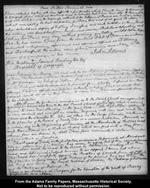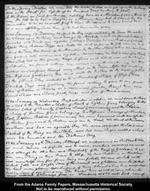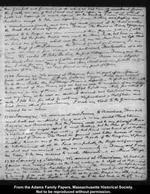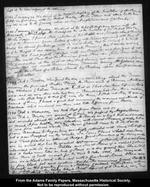Page 1
Peace Bilbao January 16. 1780
I have collected together with some difficulty a few Gazettes, which I have the honor to transmit to Congress, from which all the News may be collected, that I have been able to learn. Congress will easily perceive the Eagerness, with which the belligerent Powers are bent on War, without manifesting the least disposition for Peace, and most of all Great Britain, whose ostentatious display of trifling Successes, and weak Exultation in them, shews that nothing can divert her from her furious course. -- But she is exhausting and sinking her Forces every day, without gaining any lasting or solid Advantage. And she has reason to fear, from the combined Fleets of France and Spain, under such enterprizing, experienced and approved Officers as D'Estaing and Duchauffault, the entire ruin of her Commerce and Navy, in the course of a Campaign or two more.
John Adams
His Excellency Samuel Huntington Esq. President of Congress.
1780 January 17. Monday.
We dined with the two Messieurs Gardoqui, and a Nephew of theirs. The American Captains Babson, Lovat and Wickes dined with Us. I spoke to Mr. Gardoqui in behalf of Fifteen American Seamen, who had been Prisoners in Portugal, and he consented to furnish them Cloaths. I assured him that although I had no express and possitive Authority to interfere, I had no doubt that Congress would do all in their Power to repay him. This was afterwards done to his Satisfaction.
After Dinner the Gentlemen accompanied Us to the Parish Church over against Mr. Gardoqui's house, and then to the Old Parish Church of St. Iago, which is certainly known to have been standing in the Year 1300. . . . The High Altar appears to be very ancient, and wrought in wooden Figures, with very neat Work. The Choir and the Sacristie &c. like all others in the large Churches. We then went to the Chamber of the Board of Trade. This is a curious Institution. Annually on a certain day in the Beginning of January, all the Merchants of Bilbao meet, write their Names on a Ball or Ballot, which are put into a Box, from whence four are drawn by Lott. These four nominate a certain Number of Councillors or Senators.
This Board of Trade, in the first place, endeavours to persuade all Merchants between whom any Controversy has arisen, to agree, but if they cannot succeed Application must be made to the Board by Petition in Writing. It is then heard and determined, subject however to an Appeal, I know not where. This Board has successfully opposed the Reception of Consuls from all Nations. The Chamber is hung round with Pictures of the present King and Queen of Spain, the late King and Queen, the Royal Exchange of London, the Exchange of Amsterdam and the Exchange of Antwerp &c.
There is an Academy, at Bergara, for the Education of the Youth of Biscay, Guipuscoa and Alava.
Page 2
In the Spring Freshes, We were told, the Water is deep enough upon the Exchange and in the Streets for Vessells of an hundred Tons burthen, to float.
A Mr. Maroni, an Irish Gentleman, residing here as a Merchant, came to visit me. He told Us he had a Daughter in a Nunnery here: but it seemed by his conversation to be an incurable Grief to him: He appeared to have buried her in a more afflicting Sense than if she had been in her grave.
1780 January 18. Tuesday.
We spent the Day in perambulating the Town. We visited the Wharves upon the River, went through the Marketts, which We found plentifully furnished with Fruits and Vegetables, Cabbages, Turnips, Onions, Beets and Carrots, Apples, Pairs, Raisins, Figgs and Nutts. We went as far as the Gate, where We had entered the Town, then turned up the Mountain by the Stone Stairs, where We saw some fine Gardens, with verdure and Vegetation. On our return We took a view of a Book Sellers Stall, but as this Country, though it gloried in its Liberty was not the Region of Litterature, We found nothing very curious or worth mentioning. We then walked in Succession, through every Street in the Town. After this, meeting The Messieurs Gardoquis, they went with Us to shew Us the trading part of the Citizens. They conducted Us to a Number of Shops, of Glass, China, Trinketts, Toys and Cutlary. We found nothing to give Us any great Idea of Bilboa or Biscay as a commercial Country, though there were several Shops and Stores, pretty large and full of Merchandizes.
1780 January 19. Wednesday.
By particular invitation We went down the River on a Visit to the Rambler a Letter of Mark of Eighteen Guns, belonging to Mr. Andrew Cabot of Beverly, Captain Lovat Commander, and the Phoenix a Brigg of fourteen Guns belonging to Messieurs Traceys of Newbury Port, Captain Babson Commander. We were honoured with two Salutes of thirteen Guns each by Babson and one by Lovat. We dined at the Tavern on Shore and had an agreable Day. We were conducted to see a new Packett of the King on the Stocks, and his new Rope walks which were two hundred and ten Fathoms long.
1780 January 20th Thursday.
Although We endeavoured in Bilbao to take as much Exercise as possible and to amuse ourselves as well as We could, and although the Attention and Hospitality of the House of Gardoqui had done
every Thing in their Power to oblige Us, Our Residence in this place was nevertheless very far from being comfortable. We were all sick with violent Colds and Coughs, some of the Servants and Children were so ill that We lived under gloomy Apprehensions, of being detained a long time and perhaps
loosing some of our Company. The Houses here as well as
every where else were without Chimneys, fires or Windows, and We could find none of
Page 3
those Comforts and Conveniences to which We had been all accustomed from the Cradle, nor any of that sweet and quiet repose in Sleep upon which health and happiness so much depend. On the twentieth, however We summoned Resolution enough to take our departure from Bilbao, and passing over a mountainous Country and very bad roads arrived at the River or rather the Brook that divides Spain from France. The Houses in Biscay and Guipuscua appeared to be larger and more convenient than those in Gallicia, Castile or Leon, but the public Houses were much the same. In the last house in Spain We found one Chimney which was the only one We saw since We left that in the House of Mr. Detournelle the French Consul in Corunna. In our Course We saw a few Villages and particularly Fontarabbia at a distance. We reached St. John De Luz, the first Village in France, and there We dined. And never was a Captive escaped from Prison more delighted than I was, for
every Thing here was clean, sweet and comfortable in Comparison of
any Thing We had found in any part of Spain.
1780 January 23.
We arrived at Bayonne. Here We paid off our Spanish Guide with all his Train of Horses, Calashes, Waggon, Mules, and Servants. To do them justice they had always shewn a disposition to assist and befriend Us to the Utmost of their Power, and We had no cause to complain of any improper Behaviour in any of them. I was obliged to sell my Mule, for which I was very sorry, as he was an excellent Animal and had served me very well. I sold him for what he cost me. We purchased a Post Chaise and hired some others for our Journey. I made my Visit to the Governor and received his in return.
1780 January 25.
We commenced our journey to Bourdeaux. There is so much heath and uncultivated Land, and so many desolate Places, between Bayonne and Bourdeaux, that the journey could not be very pleasant. It is a Region where one might expect to meet Robbers, but the Police of France was so vigilant and decisive that nothing of that kind was heard of at that time in any part of France. The Road in general was better because it was smoother than in any of the great paved Roads of the Kingdom. We found the Entertainment at all the Inns comfortable, the Horses and Carriages as alert and convenient as they are commonly in France, and I was too happy to be very anxious to make Observations on Minor Things.
1780 January 29. Saturday.
We arrived at Bourdeaux. We had met Couriers and received Letters on the Road, inviting Us to alight at all the principal Inns in Bourdeaux. The Reputation of entertaining the American Ambassador, must have been the motive to all this Zeal, for our Number was so small, that the profit to be made of Us could not be great. As all the public Houses were alike unknown to me, I ordered our Postilion to drive Us to the best house in the City and
Page 4
left it to his judgment to determine.
1780 January 30.
We dined at the Hotel D'Angleterre, at the Invitation of Mr. Bondfield, in Company with Sir Robert Finlay, Mr. Le Texier and others. In the Evening We went to the Comedy where We saw Amphitrion and Cartouche.
1780 January 31. Monday.
We dined at the Hotel D'Angleterre, again with Mr. Maccarty, Mr. Delap, Mr. Bondfield &c. at the Invitation of Sir Robert Finlay. Mr. Le Texier I found still entertained his Doubts and Scruples about the Success of the American Cause. Instead of entering into serious Argument with him, I treated his dismal forebodings with so much Levity, that he seemed to be hurt, as if he thought I was exposing him to ridicule. Perceiving this I desisted and only observed that I was perfectly satisfyed with our Prospects and [a] few Years if not months would shew that the American Cause stood upon firm Foundations. The Conversation at this as at all other such dinners, was upon commonplace Topicks and not worth Remembrance. Towards Evening Mr. Gabarus [Cabarrus] came in with the News of a Blow struck by Rodney upon the Spaniards off Gibraltar.
1780 Feb. 1. Tuesday.
We spent the day in rambling about the Town viewing the principal Public Places, the Remains of Roman Antiquities, Vaubans Chateau Trompette &c. But as I had seen these before in April 1778 and as every Man who has been in Bourdeaux has seen them and every Man who shall travel to that City may see them, I shall not stay to give any Account of them. I heard a great deal concerning the manners and Morals of Bourdeaux which convinced me there was little difference from Paris.
1780 Feb. 2. Wednesday.
We took Post [for] Paris and on
1780 Feb. 4. Fryday
We arrived at Cou. We passed by Angouleme and encircled almost the whole Town. It stands on a high Hill and is walled all round. A fine healthy, Airy Situation, with several Streams of Water below it and fine interval Lands. The River Charente runs by it. The Lands from Bourdeaux to Angouleme, are chiefly cultivated with Vines, which afford but a poor Prospect in the Winter. In some Places Wheat was sown and Vines planted in alternate Ridges. Great Numbers of the Vineyards are in a Soil that has the greatest Appearance of Poverty. It is a red Loom intermixed with so many Pebbles and small Stones of a reddish Colour that it looks more like an heap of Stones or a dry gravel, than like a Soil where there is Earth enough for the Vines to take root. Other Vineyards are in a black Sand, intermixed with a few small Stones. Others are in fine, black, fat and mellow Mould. The numerous Groves, Parks and Forrests in this Country, form a striking Contrast with Spain, where the whole Country looks like a Bird deprived of its Feathers, every Tree, Bush and Shrub, being pared away.




